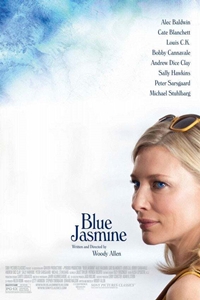Blue Jasmine (PG-13) ★★★★
 It's hard to tell whether Blue Jasmine is a sad story about funny people or a funny story about sad people. In his latest effort, which brings the director back home from Europe to the streets of upscale Manhattan and the alleys of working class San Francisco, Woody Allen grabs from his bundles of comedic and dramatic tricks, weaves the lot together, and renders something altogether undefinable in mood. Throughout the story of Cate Blanchett's fallen-from-grace socialite Jasmine, we find ourselves unsure of whether to laugh at her obnoxious eccentricities or cry over her wicked toxicity. So what do we do? We simply take it all in, welcoming the delightful confusion as something altogether new for cinema.
It's hard to tell whether Blue Jasmine is a sad story about funny people or a funny story about sad people. In his latest effort, which brings the director back home from Europe to the streets of upscale Manhattan and the alleys of working class San Francisco, Woody Allen grabs from his bundles of comedic and dramatic tricks, weaves the lot together, and renders something altogether undefinable in mood. Throughout the story of Cate Blanchett's fallen-from-grace socialite Jasmine, we find ourselves unsure of whether to laugh at her obnoxious eccentricities or cry over her wicked toxicity. So what do we do? We simply take it all in, welcoming the delightful confusion as something altogether new for cinema.
There aren't a lot of movies like Blue Jasmine, not even in Allen's repertoire. Yes, he's done ''dramedies'' before. But Blue Jasmine doesn't stock comical scenes beside dramatic ones. The mood, as a matter of fact, is quite stable throughout the film (funny, considering just how far from that description the main character ends up being). In every scene, there is the call to arms for laughter: it's hilarious that Jasmine is so self-obsessed that she stomps all over her good natured sister's very sense of being, instinctively putting down her lifestyle, apartment, job, taste in men, et al. It's also quite sad, for the both of them. For the irreparably corroded Jasmine her poor victim Ginger, played with such a brilliant earnestness by Sally Hawkins that you'll wonder how she didn't snag top billing.
The collection of inhabitants of Allen's colorful worlds - the dazzling New York upper echelon of Jasmine's past living as the do-nothing housewife to a Bernie Madoff doppelganger (Alec Baldwin), scenes of which are interspersed through the narrative of her ''getting back on her feet'' story that takes place on her estranged sister's San Francisco shantytown apartment - are equally riveting and bleak. As Ginger's ex-husband, we have perhaps the film's star player Andrew Dice Clay, who reserves unkempt resentment for his former sister-in-law after her husband robbed him of every penny he had. Now in hot pursuit of Ginger's hand in marriage is Chilli, another action hero of the blue collar flavor. Offering the best performance of Bobby Cannavale's career, Chilli serves as Jasmine's primary external conflict in the post-nervous breakdown era of her life, urging Ginger to wake up to the selfish machinations of her narcissistic sis.
In every crevice of this film, there are pastel brights and Allen's signature pitch black blues. His main characters and background players - the most memorable of the yet unmentioned bunch being Louis C.K. as a stammering suitor to Ginger - are so endearingly effervescent, but all the while steeped in a maudlin, dank desperation, that no particle of the complex movie gets away without both the urge to chuckle and well up. For a filmmaker so vividly embedded in a specific creative identity, Allen proves himself capable of surprises with Blue Jasmine. It is unlike anything he has done lately, perhaps ever. Unlike anything Hollywood in totality has put out, as a matter of fact. In its perplexing muddled identity, Blue Jasmine finds itself to be a nearly perfect story of humanity.
Follow Michael Arbeiter on Twitter @MichaelArbeiter
To get the full Quicklook Films experience, uncheck "Enable on this Site" from Adblock Plus
box office top 10

Civil War Released: April 12, 2024 Cast: Kirsten Dunst, Wagner Moura 25.7M

Godzilla x Kong: The New Empire Released: March 29, 2024 Cast: Rebecca Hall, Brian Tyree Henry 15.5M

Ghostbusters: Frozen Empire Released: March 22, 2024 Cast: Paul Rudd, Carrie Coon 5.8M

Kung Fu Panda 4 Released: March 8, 2024 Cast: Jack Black, Viola Davis 5.5M

Dune: Part Two Released: March 1, 2024 Cast: Timothée Chalamet, Rebecca Ferguson 4.3M

Monkey Man Released: April 5, 2024 Cast: Dev Patel, Sikandar Kher 4.1M

The First Omen Released: April 5, 2024 Cast: Nell Tiger Free, Bill Nighy 3.8M

The Long Game Released: April 12, 2024 Cast: Dennis Quaid, Gillian Vigman 1.4M

Shrek 2 Released: May 19, 2004 Cast: Mike Myers, Eddie Murphy 1.4M

Sting Released: April 12, 2024 Cast: Alyla Browne, Ryan Corr 1.2M






